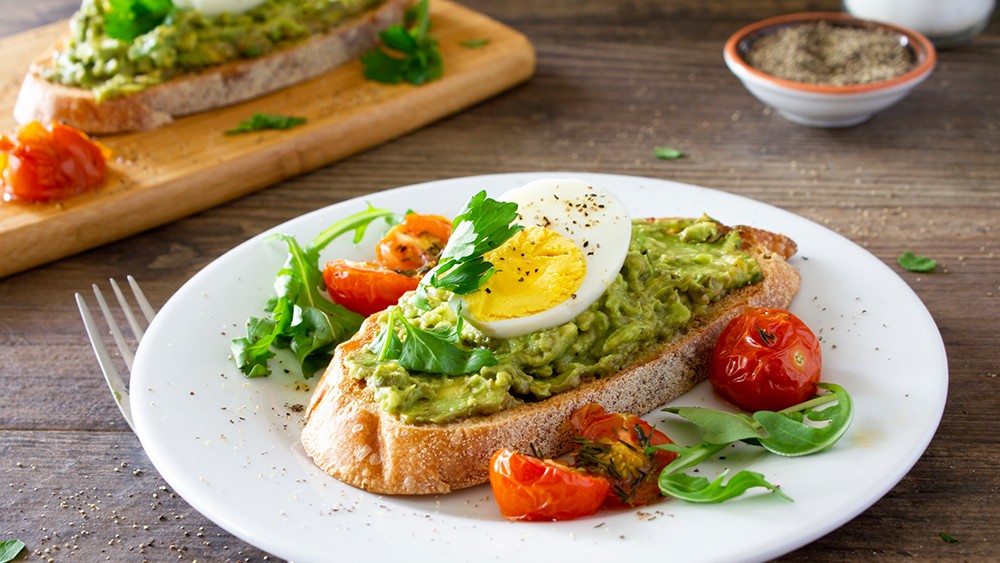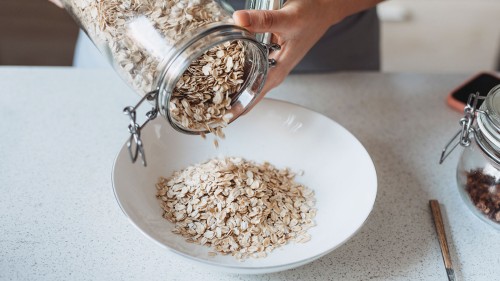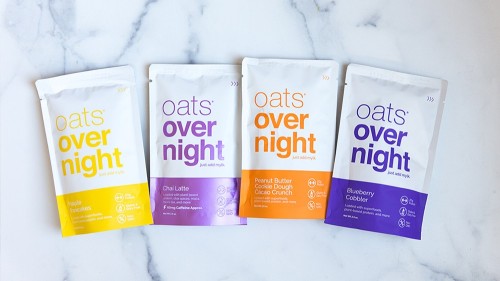Dietitian Shares Her Favorite 10 Foods and Drinks for a Healthy Breakfast
Published on February 25, 2022
Medically Reviewed by Kelsey Costa, MS, RDN
Whether you’re wanting to improve your diet, manage your weight, boost your metabolism, or anything in between, what you choose to eat for breakfast can make a big impact.


It’s no secret that what you eat throughout the day has a significant impact on your overall health. Yet, in addition to what you eat, when you eat can also make a big difference.
Starting your day off with healthy breakfast foods can provide your body with lasting energy and keep you full for hours, while also jumpstarting your metabolism for the day.
A healthy breakfast is one that is balanced with complex carbohydrates, protein, fat, and fiber. On the other hand, an unbalanced breakfast may be high in refined carbohydrates and sugar or lacking in protein, fat, and fiber.
Skipping breakfast or eating one that is unbalanced can have a negative impact on your health and your everyday quality of life.
Skipping breakfast may leave you feeling sluggish, while an unbalanced breakfast is likely to lead to a spike and crash in energy not long after eating.
These choices will also likely cause increased hunger, irritability, and difficulty concentrating throughout the day.
If you’re wondering what the best healthy breakfast foods are, here are 10 foods and drinks to put you on the right track.
1. Oatmeal
Oatmeal has been consumed for centuries as a classic breakfast food. This classic also comes with a lot of health benefits.
Research has shown oatmeal to be beneficial for managing and preventing a variety of chronic conditions like heart disease, diabetes, obesity, and digestive disorders. (1)
Oatmeal is highly nutritious. It provides 5 grams of plant-based protein, 4 grams of fiber, and only 2.5 grams of fat per 1/2 cup serving of rolled oats. (2)
It is also a good source of iron and contains small amounts of B vitamins and other nutrients.
Most of the fiber in oatmeal is soluble fiber, and oats contain a unique type of it called beta-glucan fiber. Beta-glucan fiber has been shown to help lower cholesterol levels.
In fact, in 1997, the United States Food and Drug Administration (FDA) approved the health claims of beta-glucan fiber from oats being useful in reducing blood cholesterol levels and helping lower the risk of heart disease. (3)
The fiber in oatmeal is slowly digested, helping you feel full for longer and stabilizing blood sugar levels.
Oats also serve as a prebiotic, which supports the health of your digestive tract.
Easy Overnight Oats Recipe
Combine the following ingredients in a jar with a lid, then let sit overnight in the refrigerator:
- 1/2 cup rolled oats
- 1–2 teaspoons chia seeds
- 1/2 cup berries or other diced fruit
- 1/2 cup milk of choice
- 1 tablespoon of nut butter
Put It Into Action
- Make overnight oats by preparing the day before and enjoying either hot or cold in the morning.
- Make baked oatmeal in a casserole dish, flavoring as desired, and enjoy servings throughout the week.
- Use rolled oats in baked goods like cookies, bread, or muffins.
2. Eggs
Chicken eggs are another staple breakfast food that is highly nutritious.
One large egg provides about 6 grams of protein and 5 grams of fat, all in just 70 calories. (1)
While some people avoid eating the yolk, it is actually the most nutrient-dense part of the egg. For example, it is one of the best food sources of choline, providing about 27% of the daily value in 1 egg yolk.
Choline is a vital nutrient for brain health, and has been shown to be especially important during pregnancy for the developing brain of a fetus.
Research has shown that egg yolks also provide the antioxidants lutein and zeaxanthin, which specifically support eye health. (4, 5)
In addition, eggs provide a good source of many B vitamins.
While eggs do contain cholesterol, dietary cholesterol has not been shown to directly contribute to higher cholesterol levels in the blood, and some research has shown that eating eggs does not increase the risk of any type of heart disease. (6)
However, the overall evidence is still mixed, and the American Heart Association still recommends that people who already have high cholesterol limit their intake of dietary cholesterol, including eggs. (7)
Healthy individuals with normal cholesterol levels can safely eat up to 2 eggs per day within the context of an overall heart-healthy diet.
Put It Into Action
- Enjoy a side of 1–2 eggs with oatmeal for a nutrient-dense, filling breakfast.
- Make egg salad by mashing hard-boiled eggs with hummus or avocado and enjoy as a sandwich or wrap.
- Combine scrambled eggs with vegetables like roasted sweet potatoes, bell peppers, and onions for a satisfying meal.
3. Greek or Icelandic-Style Yogurt
Yogurt is a versatile breakfast option that is great to eat on the go or use as a healthy add-in or topping. Not all yogurts are the same, though.
Greek and Icelandic-style yogurt (called Skyr) are thicker and creamier yogurts that are higher in protein compared to traditional yogurt. Higher protein content means that Greek yogurt and Skyr are more satisfying.
Yogurt also provides a good source of minerals, including calcium, potassium, and phosphorus. (8)
Yogurt is also well-known for its natural probiotics due to the fermentation process it goes through during creation.
Not all yogurt contains live probiotics, though, so it’s best to look for the term “live active cultures” on the label or in the ingredients list. This label is regulated by the International Dairy Foods Association. (9)
Many flavored yogurts are high in added sugar, so it’s best to choose a plain kind and flavor it yourself with things like fresh berries, unsweetened coconut flakes, low-sugar granola, cinnamon, or a small amount of natural sweetener like raw honey.
Easy Yogurt Parfait Recipe
Combine the following:
- Plain yogurt
- Fresh berries or diced fruit
- Low-sugar granola
- Sprinkle of chia, flax, or hemp seeds
- Dash of cinnamon
- A small amount of raw honey for sweetness
Put It Into Action
- Make a yogurt parfait in a mason jar the night before, so it’s easy to grab and go in the morning.
- Use low-fat yogurt in place of sour cream for less fat and more nutrients.
- Make homemade frozen yogurt popsicles or yogurt bark to enjoy on a warm day.
- Add a large scoop of yogurt to your morning smoothie.
4. Smoothie
Smoothies are another simple way to pack a lot of nutrients into your morning meal. They also have the benefit of being quick to make and being able to be eaten on the go.
There are endless ways to create a smoothie, but not all of them are as healthy as you might think. If you’re not careful, some smoothies can be loaded with added sugar, especially if you’re ordering them from a restaurant.
When making smoothies for breakfast, aim to include not just carbohydrates from fruit, but also a source of protein and healthy fat. This combination will provide more nutrients and keep you fuller for longer.
Nut butter, as well as chia, hemp, and flax seeds, are all healthy options that provide both fat and protein. Unsweetened soy or flax milk also provides a healthy dose of protein and fat.
Yogurt and pure protein powders are other ways to add protein, while things like shredded coconut and avocado add both fat and fiber.
Try adding some extra nutrition with vegetables that blend well into smoothies without affecting the taste much. Zucchini, leafy greens, and cauliflower are great choices that can be added to your smoothie, fresh or frozen.
Creamy Blueberry Avocado Smoothie Recipe
Blend the following ingredients together:
- 1/2 frozen banana
- 1/2 avocado
- 1/2 cup frozen blueberries
- 1 scoop vanilla protein powder
- 1 handful of leafy greens
- 1/2 to 3/4 cup milk
Put It Into Action
- Create your own smoothie recipe by blending together your choice of fruit, vegetable, protein and fat source, and milk of choice for a delicious start to your morning.
- Make a smoothie bowl by pouring the contents of a smoothie into a bowl and topping it with things like low-sugar granola, coconut flakes, hemp seeds, and additional sliced fruit.
5. Coffee
Aside from water, coffee is the most popular beverage consumed by Americans. If you’re like most adults, you look forward to your morning “cup of joe” and may rely on its natural caffeine to help get you through your day.
Drinking coffee can have many health benefits.
Coffee is an excellent source of antioxidants. Studies have shown that the caffeine in coffee may help boost metabolism and assist with fat burning, which can help with weight management. (10, 11)
An 8-ounce cup of coffee provides about 80 to 100 milligrams of caffeine. The FDA recommends not exceeding 400 mg a day, which is the equivalent of about 4–5 cups of regular coffee. (12)
However, an average cup of coffee can easily become a decadent dessert when it is loaded with added sugar, which takes away from these benefits.
To keep coffee healthy, it’s best to make it yourself or order wisely when purchasing out.
Some ways to do this are to keep portion sizes reasonable, choose unsweetened plant-based milk (if making a latte), use small amounts of half-and-half rather than sweetened coffee creamer for traditional coffee, and skip the added whipped cream and syrups.
Using small amounts of sugar alternatives such as a few drops of liquid stevia (or one packet if using the powdered form) or a dash of monk fruit extract are good ways to add a little bit of sweetness, but you may find you don’t need it over time.
You can treat yourself to a more decadent cup of coffee when you want to but beware of added sugars if you’re aiming for a healthy beverage.
Put It Into Action
- Next time you order a latte, ask for unsweetened almond, soy, coconut, or oat milk and skip the whipped cream.
- Use half-and-half instead of sweetened coffee creamers to cut back on added sugar.
- Keep serving sizes of coffee to about 16 ounces, or 2 cups per day.
6. Tea
Tea, especially green tea, is another beverage that is high in antioxidants. This makes it a great choice to pair with your breakfast. (13)
Green tea contains a compound called epigallocatechin gallate (EGCG), which is a type of phytochemical. EGCG helps promote a long and healthy life by protecting against many chronic conditions like heart disease, type 2 diabetes, and mental decline. (14, 15, 16)
Matcha green tea is a variety of green tea that is made from ground whole tea leaves and may contain even more antioxidants than traditional green tea.
Many types of tea naturally contain caffeine, but provide about half as much as coffee for the same serving size.
Like coffee, it’s best to avoid tea that contains a lot of added sugar. It is a good idea to order unsweetened tea at restaurants since regular tea is usually full of added sugar.
Put It Into Action
- Sip on lemon or ginger tea with a small amount of raw honey in the morning to support healthy digestion and immunity.
- Make a green tea latte by combining steamed plant-based milk with brewed green tea.
- Add a small amount of matcha green tea powder to your morning smoothie.
7. Fruit
Fruit has so many benefits, including being naturally sweet and extremely versatile.
Fruit provides a source of fiber, which is a complex carbohydrate. The fiber in fruit will give you an energy boost without the crash of refined or “simple” carbohydrates.
Fiber helps support a healthy weight, proper digestion, and balanced blood sugar. It may also reduce the risk of some types of cancer. (17)
However, fruit juice does not provide fiber, and is instead more concentrated in sugar. This is why fruit juice should be limited.
Many types of fruit are easy to eat on the go, specifically apples, bananas, and oranges.
Depending on the type of fruit you eat, you will also be getting important vitamins, minerals, antioxidants, and other plant compounds that benefit your health in many ways.
There are endless ways to enjoy fruits. For a balanced meal that will keep you full for longer, pair fruit with some healthy fat and protein, such as nut butter or Greek yogurt.
Put It Into Action
- Sprinkle berries on top of oatmeal or yogurt.
- Add tropical frozen fruit like mango or pineapple along with leafy greens to create a nutrient-dense smoothie.
- Have bananas or sliced apples topped with nut or seed butter.
8. Avocado
Avocados are often called a “superfood,” and for good reasons.
One reason is that avocados are extremely nutrient-dense. Just one-half of a regular-sized avocado contains nearly 7 grams of fiber and 10% of your daily potassium needs. (18)
Potassium helps keep many bodily processes functioning the way that they should. This includes nerve impulses, muscle contraction, blood pressure regulation, and fluid balance. (19)
Avocados are also a great source of magnesium, providing 7% of your daily needs in one-half of the fruit.
Magnesium is required for more than 300 crucial processes in the body by serving as a cofactor for enzymes. It is important for proper sleep, blood sugar control, digestion, and more. (20, 21)
This serving also provides about 15% of your daily vitamin E needs. Vitamin E acts as an antioxidant in the body and also supports the immune system and many metabolic processes. (22)
While avocados are high in fat, it is almost entirely unsaturated fat. Studies have shown that replacing saturated fats in your diet with unsaturated fats can reduce your risk of heart disease. (23, 24)
The fat and fiber in avocados may also help you feel fuller for longer. This can be helpful for those who are practicing weight management. (25)
However, since avocados are also high in calories, people who are trying to manage their weight may want to limit their intake to 1/2 of an avocado per day. Other people can enjoy up to 1 whole fruit per day.
Put It Into Action
- Slice avocado, remove the pit and top it with a poached egg in the center.
- Add avocado to your morning smoothie for a deliciously creamy result with added healthy fats.
- Enjoy a whole grain toast topped with avocado for a savory, nutrient-packed breakfast.
9. Whole Grain Bread
Whole grain bread is another classic breakfast food that offers a variety of health benefits.
Some white bread can be ultra-processed and contain unhealthy additives such as preservatives and added sugar. They are low in fiber, which is an important part of health.
Whole grains are a type of complex carbohydrate and provide a good source of fiber. A recent study done in Europe found that eating more whole grains could lower your risk of developing type 2 diabetes. (26)
Another recent study reported that not eating enough whole grains can contribute to cancer risk. (27)
Bread products like whole-grain English muffins and bagels can be made from grains like wheat, oats, and rye flours.
People on a gluten-free diet can still enjoy whole grain products as long as they are made from gluten-free grains. Quinoa and brown rice are two healthy and naturally gluten-free grains.
Oats are also naturally gluten-free but can often be cross-contaminated with gluten. That’s why it’s important to buy only certified gluten-free oats when necessary.
Put It Into Action
- Pair whole-grain toast with a side of scrambled eggs and fruit for a filling and balanced meal.
- Toast a whole-grain English muffin and spread it with nut butter.
- Enjoy a whole-grain muffin paired with a side of yogurt in the morning.
10. Nuts and Seeds
Nuts and seeds are a true nutrition powerhouse.
Like avocados, they are high in unsaturated fat, benefiting your health in many ways. Also, like avocados, nuts and seeds provide a good source of fiber, magnesium, potassium, and vitamin E. (28)
They also provide good sources of the minerals zinc, phosphorus, and iron.
Zinc is important for immune health. Phosphorus supports bone health, and iron is important for forming red blood cells and providing oxygen to the body. (29, 30, 31)
Nuts and seeds are also good sources of plant-based protein. 1 oz of mixed nuts contains about 6 grams of protein, while just 1/4 cup of pumpkin seeds provides about 10 grams of protein.
Nut and seed butters have a similar nutrient density. For example, two tablespoons of peanut or almond butter contain about 7 grams of protein. (32)
It is best to avoid nut and seed butters with added sugar, salt, and vegetable oils like palm oil.
Put It Into Action
- Sprinkle nuts on top of oatmeal or yogurt.
- Mix nut or seed butter into a smoothie or oatmeal.
- Spread nut or seed butter on top of whole-grain toast.
The Bottom Line
Not only is it important to eat breakfast every day, but what you choose to eat makes a difference in your energy levels, mood, blood sugar, and more.
Choosing healthy breakfast foods can also help jumpstart your day and metabolism while supporting your body in fighting off disease.
Ten of the best breakfast foods and drinks to include in your diet include oatmeal, eggs, Greek or Icelandic yogurt, smoothies, coffee, tea, fruit, avocados, whole grain bread, and nuts and seeds.
There are endless ways to make a healthy breakfast by combining any of these healthy breakfast foods, such as putting sliced avocado on toast, topping yogurt with fruit like berries, and stirring nut butter into oatmeal.
You can also come up with your own favorite recipe.
Eating a combination of these foods provides protein, fiber, healthy fats, and other important nutrients to power through your day.
At WellnessVerge, we only use reputable sources, including peer-reviewed medical journals and well-respected academic institutions.
- Different Oat Ingredients Stimulate Specific Microbial Metabolites in the Gut Microbiome of Three Human Individuals in Vitro:
https://www.ncbi.nlm.nih.gov/labs/pmc/articles/PMC6217528/ - MyFoodData: Whole Foods Market Inc. - Old-Fashioned Rolled Oats:
https://tools.myfooddata.com/nutrition-facts/557209/wt1/1 - FDA (CITE: 21CFR101.81) Health claims: Soluble fiber from certain foods and risk of coronary heart disease (CHD):
https://www.accessdata.fda.gov/scripts/cdrh/cfdocs/cfcfr/cfrsearch.cfm?fr=101.81 - The Effect of Lutein on Eye and Extra-Eye Health:
https://www.ncbi.nlm.nih.gov/labs/pmc/articles/PMC6164534/ - Zeaxanthin: Metabolism, Properties, and Antioxidant Protection of Eyes, Heart, Liver, and Skin:
https://www.ncbi.nlm.nih.gov/labs/pmc/articles/PMC6770730/ - Eggs might help your heart, not harm it:
https://www.health.harvard.edu/heart-health/eggs-might-help-your-heart-not-harm-it - Dietary Cholesterol and Cardiovascular Risk: A Science Advisory From the American Heart Association:
https://www.ahajournals.org/doi/full/10.1161/CIR.0000000000000743 - MyFoodData: Siggi's - Vanilla Icelandic Cream-Skyr Strained Lowfat Yogurt:
https://tools.myfooddata.com/nutrition-facts/730780/wt1/1 - International Dairy Foods Association: Live & Active Cultures Seal:
https://www.idfa.org/live-active-cultures-seal - Antioxidant and Antiradical Activity of Coffee:
https://www.ncbi.nlm.nih.gov/pmc/articles/PMC4665516/ - Normal caffeine consumption: influence on thermogenesis and daily energy expenditure in lean and postobese human volunteers:
https://pubmed.ncbi.nlm.nih.gov/2912010/ - Spilling the Beans: How Much Caffeine is Too Much?:
https://www.fda.gov/consumers/consumer-updates/spilling-beans-how-much-caffeine-too-much - Theaflavins in black tea and catechins in green tea are equally effective antioxidants:
https://pubmed.ncbi.nlm.nih.gov/11533262/ - Green tea consumption and risk of cardiovascular and ischemic related diseases: A meta-analysis:
https://pubmed.ncbi.nlm.nih.gov/26318390/ - Effects and Mechanisms of Tea for the Prevention and Management of Diabetes Mellitus and Diabetic Complications: An Updated Review:
https://www.ncbi.nlm.nih.gov/labs/pmc/articles/PMC6617012/ - Green Tea Intake and Risks for Dementia, Alzheimer's Disease, Mild Cognitive Impairment, and Cognitive Impairment: A Systematic Review:
https://pubmed.ncbi.nlm.nih.gov/31137655/ - Harvard T.H. Chan School of Public Health: Fiber:
https://www.hsph.harvard.edu/nutritionsource/carbohydrates/fiber/ - MyFoodData: Avocados:
https://tools.myfooddata.com/nutrition-facts/171705/wt4/0.5 - NIH: Potassium:
https://ods.od.nih.gov/factsheets/Potassium-HealthProfessional/#h5 - NIH: Magnesium:
https://ods.od.nih.gov/factsheets/Magnesium-HealthProfessional/ - The effect of magnesium supplementation on primary insomnia in elderly: A double-blind placebo-controlled clinical trial:
https://www.ncbi.nlm.nih.gov/labs/pmc/articles/PMC3703169/ - NIH: Vitamin E:
https://ods.od.nih.gov/factsheets/VitaminE-HealthProfessional/ - Saturated Fats Compared With Unsaturated Fats and Sources of Carbohydrates in Relation to Risk of Coronary Heart Disease: A Prospective Cohort Study:
https://pubmed.ncbi.nlm.nih.gov/26429077/ - Swap Saturated Fats with Unsaturated Fats for a Healthy Heart:
https://www.cardiosmart.org/news/2017/7/swap-saturated-fats-with-unsaturated-fats-for-a-healthy-heart - Using the Avocado to Test the Satiety Effects of a Fat-Fiber Combination in Place of Carbohydrate Energy in a Breakfast Meal in Overweight and Obese Men and Women: A Randomized Clinical Trial:
https://pubmed.ncbi.nlm.nih.gov/31035472/ - Type 2 Diabetes-Related Health Economic Impact Associated with Increased Whole Grains Consumption among Adults in Finland:
https://pubmed.ncbi.nlm.nih.gov/34684582/ - Estimated economic burden of cancer associated with suboptimal diet in the United States:
https://pubmed.ncbi.nlm.nih.gov/34652592/ - MyFoodData: Dry-Roasted Mixed Nuts (Salted):
https://tools.myfooddata.com/nutrition-facts/170585/wt2 - NIH: Zinc:
https://ods.od.nih.gov/factsheets/Zinc-HealthProfessional/ - NIH: Phosphorus:
https://ods.od.nih.gov/factsheets/Phosphorus-HealthProfessional/ - NIH: Iron:
https://ods.od.nih.gov/factsheets/Iron-HealthProfessional/ - MyFoodData: Almond Butter:
https://tools.myfooddata.com/nutrition-facts/168588/wt1/2






